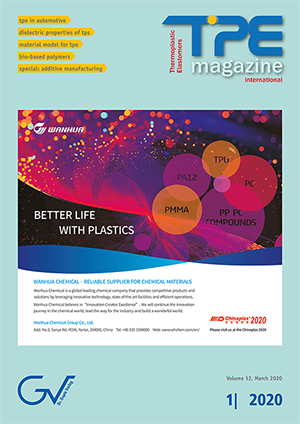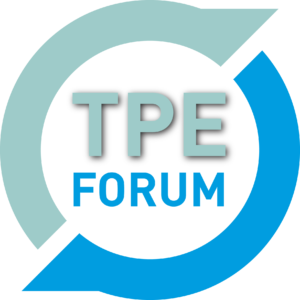“Better life with Plastics!“ This the key message of our cover page advertiser Wanhua. So true! Plastics help us in these difficult times in many areas from medical devices, breathing masks to protection equipment and clean single-use food packaging, …Read what thermoplastic elastomers can do in TPE Magazine. Issue 01/2020 is out now!
TPE expert Bob Eller shares insights of opportunities for TPEs in new mobility concepts. Claudia Kummerloewe and her team from the University of Applied Sciences Osnabruck have examined the effects of oxidic filler particles on dielectric properties of TPS. Christoph Zimmermann, IKV in Aachen gives an update of a visco-elasto-plastic material model for TPEs. Together with the nova-Institute we look at trends and figures of the global bio-based polymer markets 2019 and we give a sneak preview of the German TPE conference 2020 in conjunction with the next meeting of the TPE Forum in Nuremberg. Hope to see you all there, safe and sound!
 Technical articles in this issue:
Technical articles in this issue:
- TPEs on the road to electric vehicles and autonomous vehicles
R. Eller (Robert Eller Associates LLC)
Automotive accounts for about 45 % of global TPE consumption. Within the automotive sector, ownership patterns are shifting toward electric vehicles (EVs), autonomous vehicles (AVs), semi-autonomous vehicles (semi-AVs), and various forms of ride sharing have entered the market. These shifts have created new functional roles for automotive TPEs.
- Effect of oxidic filler particles on dielectric properties of thermoplastic elastomers based on SEBS
F. Kühnast, M. Mertes, D. Bröker, N. Vennemann, C. Kummerlöwe (University of Applied Sciences Osnabrück) and A. Siebert (Weros Technology GmbH)
This paper describes the effect of the oxidic filler particles barium titanate, titanium dioxide and zinc oxide on the dielectric properties of a commercial thermoplastic elastomer based on poly(styrene-block-ethylene/butylene-block-styrene) (SEBS) containing a high amount of plasticizer. The relative permittivities were determined in the frequency range between 20 Hz and 1 kHz by use of an alternating current testing bridge (LCR meter).
- Efficient testing and development of a visco-elasto-plastic material model for thermoplastic elastomers
Ch. Hopmann and C. Zimmermann (RWTH Aachen University)
Thermoplastic elastomers (TPE) show a strong non-linear material behaviour in combination with a stress softening after initial loading and a high residual deformation after unloading. This material property depends on the stress state as well as on the temperature. In order to consider this characteristic during the design and development of TPE parts, suitable material models have to be developed.
Read reports about:
- The global bio-based polymer market 2019. A revised view on a turbulent and growing market
Turbulent times for bio-based polymers in 2019: PLA sold out despite expansion, as did PHA. Bio-based PP available for the first time, increased production of PBAT, PBS, bio-based PE, starch-containing polymer compounds and epoxy resins. Lower production is seen particularly in bio-based PET. At the same time, there is a lack of support from policy makers, who are taking bio-based and biodegradable plastics into collective punishment with fossil plastics in the Plastic Policy. These are some of the findings of the new market and trend report “Bio-based Building Blocks and Polymers – Global Capacities, Production and Trends 2019 – 2024” from the German nova-Institute. The report shows capacities and production data for all bio-based polymers in the year 2019 and a forecast for 2024. The market and trend report is written by the international biopolymer expert group headed by nova-Institute. The corresponding authors come from Asia, Europe and North America.
- New material developments and process technologies in the field of TPEs. German Plastics Center invites to TPE conference and meeting of the TPE Forum in Nuremberg
The annual TPE conference in Nuremberg, Germany, will be hosted in 2020 by SKZ Das Kunststoffzentrum and accompanied by the VDI and the German Rubber Industry Association (wdk). The conference will take place from 24 – 25 June 2020 in the Karl-Bröger-Zentrum just a short walk away from Nuremberg’s main station. In the run-up to the industry meeting, on 23 June, the plenary meeting of the TPE Forum will take place, to which all interested parties are invited. On the evening of the first day of the conference, participants can look forward to a guided tour of the historical stone corridors of the Franconian city and a joint dinner. The article gives an outlook on the conference as well as the programme and introduces a new research project on short fibre-reinforced TPE, recently started by SKZ and TITK.
Further information about the new issue at https://www.gupta-verlag.com/magazines/tpe-magazine-international/01-2020.
